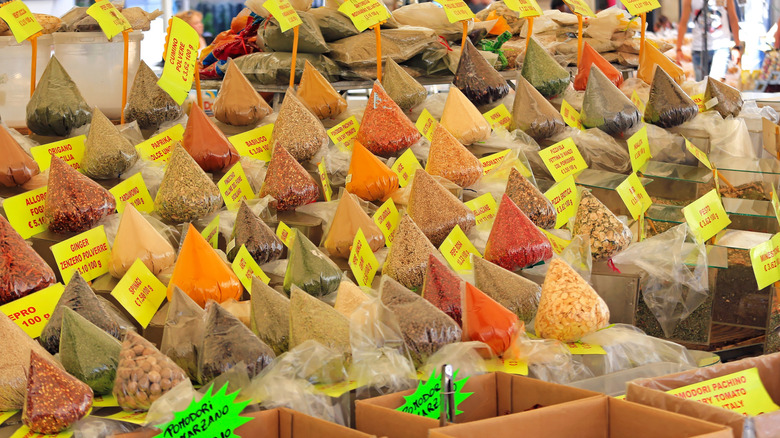Why Are Spices More Affordable At International Grocery Stores?
With grocery prices significantly higher in recent years, the way people are shopping for groceries is changing. One way that change is manifesting is through increased demand at international grocery stores where the price of goods is much lower compared to big box grocery stores like Kroger, Smith's, and H-E-B.
Spices at these international grocery stores, in particular, can leave people wondering why they ever bought them from a supermarket to begin with. That being said, it wouldn't be unreasonable to raise a suspicious eye at just how cheap the spices are. After all, if something sounds too good to be true, sometimes it really is. So, what's the deal — why are spices more affordable at international grocery stores? Are they lower quality?
The answer isn't as simple as that. For one, there are thousands of such markets all across the country, each making slightly different decisions in slightly different environments with slightly different products. But as a blanket generalization, these markets are able to sell spices for cheap by operating on tight margins, keeping overhead costs low, and choosing products with cheaper packaging than those little glass jars.
International grocery stores offer better prices by cutting costs
For anyone scratching their head over what that means, let me explain. Margins refer to how much a grocery makes in profit with any given product. So, if a bag of oregano sold at one of these international grocery stores is purchased wholesale for, say, $1.00 each — and sells for $1.15 — that means the store is operating on a margin of 15 cents. More realistically, grocery stores are operating on margins of 1% to 3%. Whatever the actual rate, international grocery stores make a habit of trimming down their margin as much as possible to entice customers while still charging enough to stay in business.
Overhead costs refers to how much money it takes to keep the brick and mortar store up and running. These costs include rent for the building, utilities, salaries, and the like. International grocery stores are often family-run, or something close to it, which keeps labor costs down. Many shops also choose locations with low rent and relatively small square footage compared to the huge supermarkets with every aisle lit up like the Fourth of July. Cheaper packaging also achieves a similar result.
All of this is to say, by making smart business decisions which reduce marketability but increase affordability, international grocery stores are able to reduce the cost of business. This produces savings which are then passed on to you, the customer. It's just one more way for you to start shopping smarter for your groceries.

